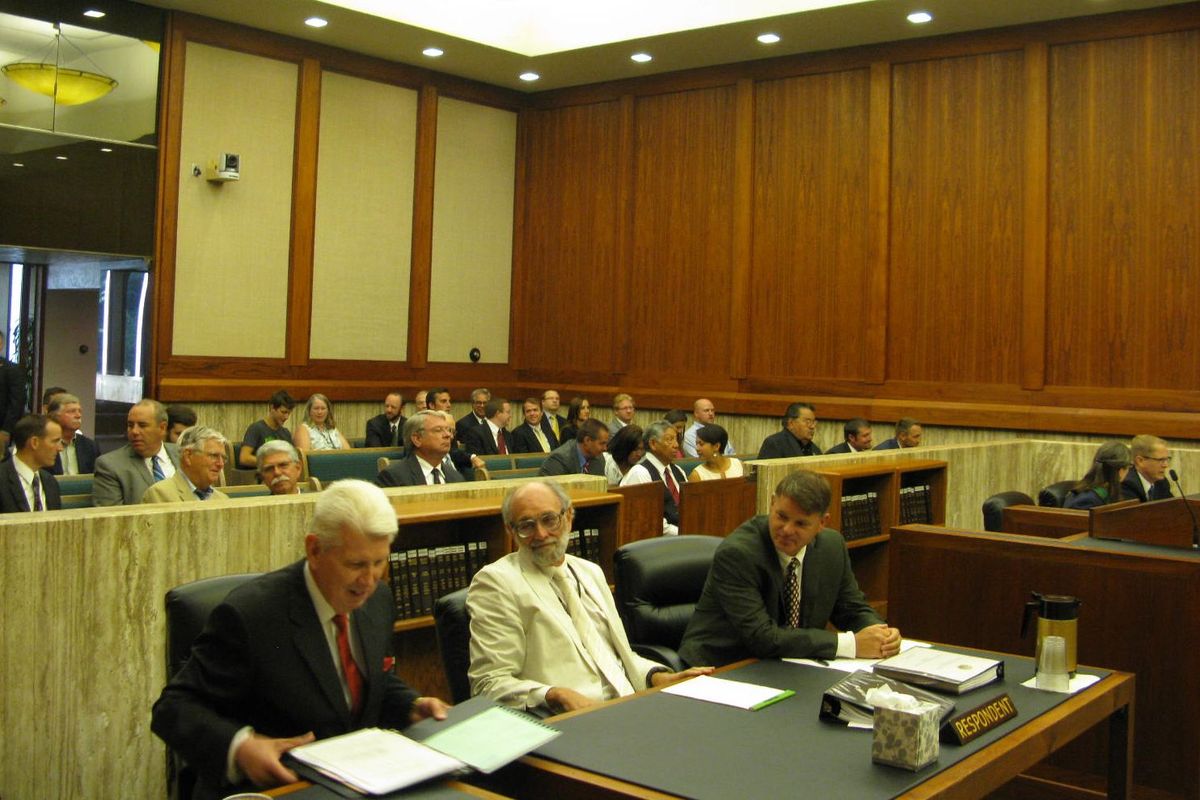Idaho justices bristle at state’s instant-racing arguments
Attorneys, parties and the audience gather in the Idaho Supreme Court's courtroom in Boise for this morning's arguments in the instant racing case (Betsy Z. Russell)
BOISE – Idaho Supreme Court justices appeared unconvinced Tuesday by arguments that the court should stay out of a dispute over a botched veto of a gambling bill, to avoid violating the separation of powers.
“If the Senate says this is what we did in our proceedings, that has to be accepted,” Deputy Attorney General Brian Kane told the court’s five justices. But Justice Roger Burdick responded, “I’m not going that far. Obviously if they do something that was unconstitutional, we have the right to step in.”
At issue is Gov. Butch Otter’s attempt to veto legislation that had overwhelmingly passed the House and Senate, aimed at repealing the Legislature’s 2013 authorization for slot machine-like “instant racing” machines. Otter delivered the vetoed bill back to the Senate in April two days after the five-day deadline set by the Idaho Constitution. The Senate acknowledged that with three letters entered into its official journal, but then tried a veto override vote anyway, and it failed.
Kane argued that the override vote was a “superseding action” that showed the Senate accepted the veto as valid, so the court should respect that.
But if Otter missed the deadline, the bill became law without his signature, argued Deborah Ferguson, attorney for the Coeur d’Alene Tribe, and the Senate can’t reconsider or override something that’s already law, nor can the governor veto it.
“If the Senate can simply vote and treat a late return as if it were timely, the five-day constitutional limit would have no meaning – it would be a loose guideline for the Legislature to work around,” Ferguson told the court. “The court is the timekeeper and the Constitution is the rule book. And the repercussions of not requiring the Senate to follow the Constitution in this critical arena of law would be a dangerous precedent and it would … impermissibly and greatly expand the governor and the Senate’s authority to govern the people of Idaho and erode the rule of law.”
Former Idaho Attorney General David Leroy, representing Coeur d’Alene Racing, operators of the Greyhound Park Event Center in Post Falls, told the court he doesn’t believe the Coeur d’Alene Tribe has standing to bring the case. Citing a recent opinion in another case by Idaho Justice Joel Horton, Leroy told the court, “Standing could never be assumed based on a merely hypothetical injury.”
The tribe, which operates its own gambling casino on its reservation in Plummer and which was turned down by the state in 1998 in its bid to open one at the Greyhound Park – where 35 of the new instant racing machines now are running – disagreed. Ferguson contended the expansion of gambling machines beyond tribal reservations directly undercuts the main funding source for tribal government functions, from schools to courts and law enforcement.
“They had the particularized interest in gaming in Idaho,” Ferguson told the court. “There’s a direct connection between this attempted veto and the harm to the tribe.”
Idaho’s anti-gambling laws are strict; they forbid most forms of gambling other than a state lottery, tribal gaming on Indian reservations, and pari-mutuel, or pooled, betting on horse races. Coeur d’Alene Racing and other horse racing operators in Idaho contend their machines are just a new form of pari-mutuel betting. In a separate dispute with the state, the tribe recently lost an appeal over its addition of a poker room at its Worley casino; federal courts ruled that poker is strictly illegal in Idaho, for anyone.
Monday’s arguments featured an extended exchange between Justice Daniel Eismann and Kane in which both repeatedly interrupted each other, voices were raised, and the justice accused Kane of “evading” his questions. Afterward, Leroy said the process was considerably more animated than usual, and the justices had clearly researched the issues at length.
Kane said his client, Idaho Secretary of State Lawerence Denney, was the wrong party to be sued, and the tribe should have sued the Senate or the governor.
But Ferguson told the court that once a bill has become law, it’s the Secretary of State’s duty under the law to file it and assign it a code section, which Denney refused to do without direction from either the Senate or the court.
“There’s no further action required of the governor,” Ferguson said. “He can’t reactivate and reopen that time frame.” Nor can the Senate, she said. “Once it became a law, the Senate lost its power to reconsider it.”
Denney, who sat in the front row of the audience for the arguments, called them “very interesting,” adding, “This was my first time in listening to the Supreme Court.” He said he thinks the Constitution is clear. But, he said, “I still don’t read the codes as saying I have the authority to do what they’re asking me to do. But if the court orders me to do it, then I do have the authority.”
The justices took the arguments under advisement and will issue their written decision in the coming weeks.

